Original and provocative, 5 Broken Cameras is deservedly nominated for the Best Documentary Feature Oscar this year.
Note:
If you want to know more about the history and politics of the Oscars, please read my book:
The circumstances of making this unique political work are just as interesting as its plot.
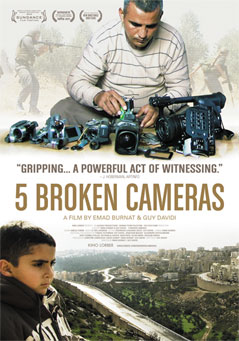
When his fourth son, Gibreel, is born in 2005, the self-taught filmmaker, Emad Burnat, a Palestinian villager, gets his first camera.
The timing could not have been better for creating a first-hand chronicle. The people of his village begin to resist the construction of a separation barrier that will inevitably affect their lives and their farmlands.
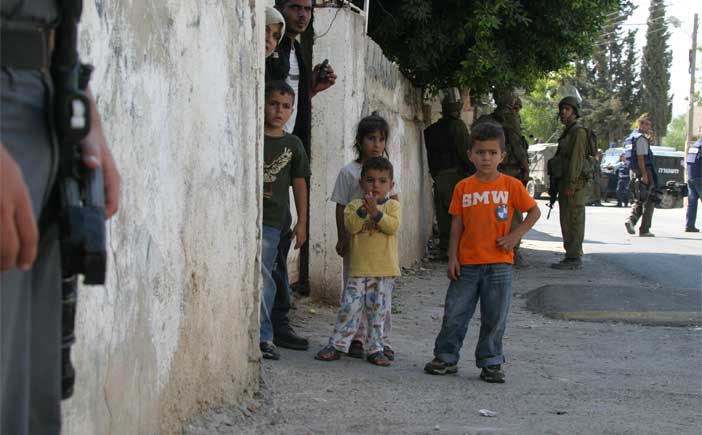
For the next year, Burnat shoots this non-violent struggle, led by two of his best friends, while simultaneously recording the growth of his own son. Soon, these events begin to affect Emad and his family. Daily arrests, violent attacks, destruction, and loss of life scare his family as the protesters are shot at or detained by the police. As Emad documents these events, one camera after another is smashed, to the point where each successive camera becomes a chapter in a long, multi-layered account of a very proud struggle.
The movie represents an unusual collaboration between an Israeli and Palestinian artists, and I hope, judging by the results of this effort, that it would lead to many more in the future.
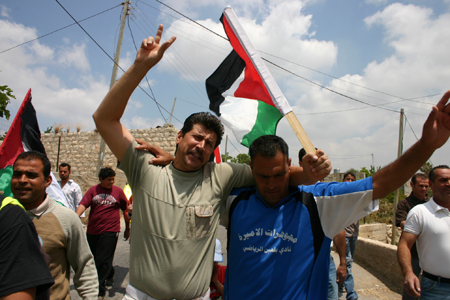
Detailed Plot:
Every camera is an episode in his long, continuous wounded life. As he attests: “If you are wounded you will always remember your wound, even after it’s healed. But what if you are injured again and again… you forget your scars. But the camera remembers and so I film to heal”.
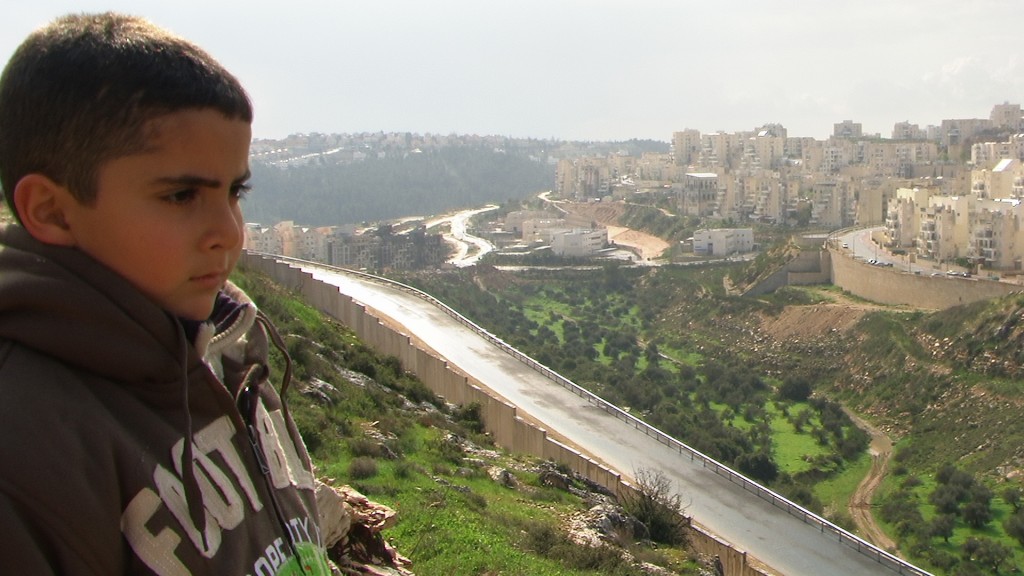
First Camera
In February 2005 when his fourth son Gibreel is born, Emad, a Palestinian peasant, gets his first camera and starts to film his family. At the same time, the people of Emad’s village Bil’in (west of Ramallah, few miles from the international Green line) discover that the separation barrier route will pass through, consuming more than half of the village’s cultivated land. Moreover, the existing settlement Modi’in Ilit is planning an expansion into the village. The construction of new buildings is set to start imminently. The villagers resist this encroachment, marching every Friday after their prayer in peaceful protest. Israeli and international activists join them to show support. Emad starts to follow this resistance, filming the demonstration with his new camera. The army’s reaction to this resistance is harsh. The soldiers release with tear gas, abuse the protesters, and even shoot rubber-coated bullets. The demonstrators try to come up every week with creative way of drawing the attention of the Israeli and international media. They tenaciously return with new types of direct, non-violent action, like tying themselves to the fence. Two of Emad’s friends are always in the first line. Adeeb is a tough looking guy. He is angry for losing his land; he expresses his anger in almost every demonstration before the soldiers–he likes to make a scene and be filmed. Phil is a very different guy. He always hangs around in the village, often with the village children. They take to him because he exudes a hopefulness absent in most other adults. The army starts to arrest people. Emad’s brother Riyad, is the first to be arrested by Israeli soldiers disguised as Palestinians. After this, Emad’s first camera is shot and broken by soldiers.
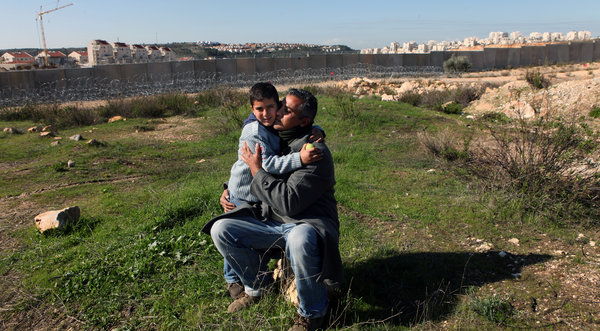
Second Camera
The separation wall is built, but people decide not to give up. Emad gets another camera from his friend Yisrael, an Israeli cameraman. Emad is filming his baby boy Gibreel grow. He also films his wife Soraya. She is Palestinian, but was born in Brazil. The entire family likes to pick olives together in the autumn. Beyond just feeding the people, the land is a connection, pulling the village together. Bil’in’s struggle becomes a symbol worldwide for non-violent popular resistance.
Over the course of the demonstrations, a great bond develops between Emad, Adeeb, and Phil. The soldiers shoot Adeeb in his leg. Phil shouts at the soldiers in anger and is arrested, but released the same day Gibreel and Phil develop a strong connection. Like other children, Gibreel finds hope in Phil that other adults do not possess. In order to make sure the lands beyond the barrier aren’t be taken, the protesters try to make their presence pervasive. There is an idea to copy one of the settlers’ tactics–put trailers on the land so that it cannot be taken. Emad and his friends do this several times but the army removes them again and again. Exasperated, they build a concrete outpost, but that too is destroyed. The villagers rebuild it, and this time it remains standing. It becomes a place for the village meetings. In retaliation, the settlers burn the olive trees. The construction of settlements continues. Emad films Daba, Phil’s brother, when he climbs over a crane trying to stop the work. Daba is arrested, and a settler breaks Emad’s second camera.
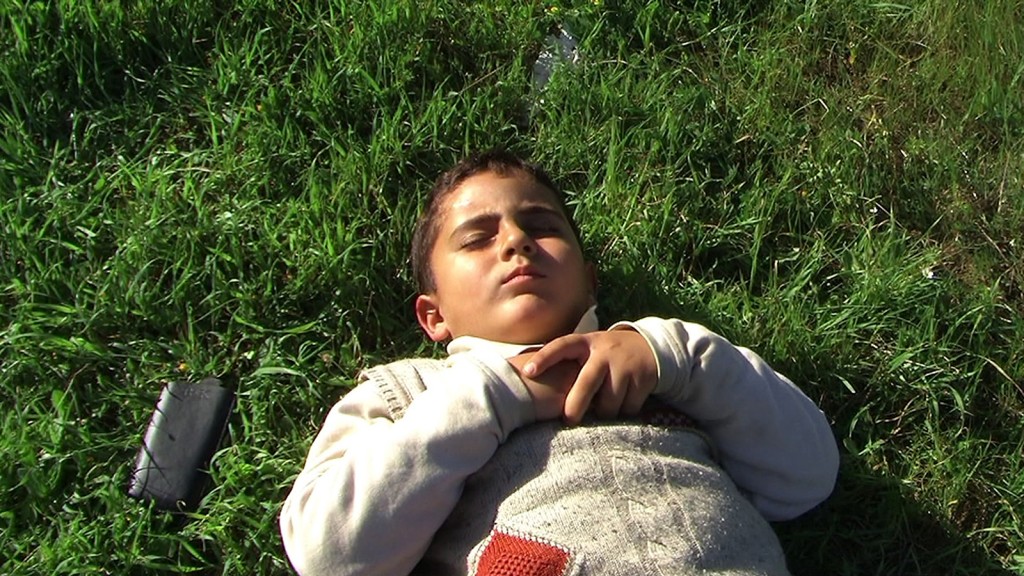
Third Camera
Gibreel is now three years old. With a new camera, Emad takes Gibreel to see the demonstration for himself. This way, he will be able to see things through his own eyes. Gabrieel watches as people he knows, including another of Emad’s brothers, are arrested. The soldiers enter the village more frequently, and start taking people from their houses.
At one point, Emad films his father and mother try to block a jeep from taking his brother away.Emad is frustrated, but that these images will mean something. At night, soldiers enter the village and arrest children in their homes for throwing rocks during demonstrations. In the morning, all the kids march in protest, crying: “We want to sleep”. But the violence continues, and an Israeli activist is injured after being hit in the head with a rubber bullet. In his house, the kids speak about brochures the army has distributed to warn people against demonstrating.
Soraya explains to them that they have to continue resisting, even as soldiers continue to look for children to arrest. One night they come into Emad’s house while he is filming and take him to the police station. He is imprisoned for a few weeks before being placed under house arrest. In a house far from Bil’in, Emad is held alone, ostensibly for throwing rocks. In reality, this is his punishment for filming. Eventually the army drops all charges, citing a lack of evidence. Once freed, Emad immediately resumes filming, despite Soraya’s pleas for him to stop. His third camera is shot at and hit. The bullet caught inside is a reminder of how fragile life is.
Fourth Camera
By 2008, many other villages have followed in Bil’in’s lead, staging demonstrations as the separation barrier begins to enter their lands. In the neighboring village, the violence becomes extreme, and there is a fear that these demonstrations will turn into a wider popular resistance—a third Intifada. In an effort to prevent this, the actions of the army become increasingly harsh.
Snipers shoot an 11-year-old boy after the funeral of 17-year-old who was shot dead. Amid the chaos, Daba, Phil’s brother, is shot in his leg. With death all around, it is hard for people to hold on to their ideals of non-violence. But just as things begin to look desperate, the Bil’in villagers find out that they have won a legal victory–the court has ruled that the existing barrier should be dismantled and erected closer to the settlement buildings. This is a small victory for some villagers who will regain part of their land. Celebrations ensue. However, time passes, and the ruling is not carried out. Emad goes to the other side of the barrier to work the land and discovers the remains of trees burned by settlers. On his way back to the village, the truck he is driving crashes into the separation wall. The images of this accident are the last to be filmed by the fourth camera.
Fifth Camera
Emad remains unconscious for 20 days in an Israeli hosptial. He sustained serious injuries, and is on the verge of death. When he first wakes up, it’s late 2008. Israel starts its attack on the Gaza strip. When Emad returns, there is no big welcome, as people are in grief over Gaza. He is recovering in his house, without support and with the knowledge he won’t be able to work physically again. Bil’in’s struggle gains worldwide attention, and politicians from all over the world come to visit to show their support. But Adeeb looks at all this and doesn’t like this charade. Inside the outpost, he hopes for a small retreat. For him, that would be success. In the meantime, new settlers are entering the empty houses that will not be returned to the villagers.
Phil is the only one who is still optimistic and who still believes in repairing the world. Gibreel is now 4 years old, and must be prepared for the worst. The violence is escalating, and during a demonstration, Phil gets hit in the chest by a gas grenade. He dies instantly. At night, Daba puts up posters of his dead brother. The village is in shock. Gibreel and the rest of Emad’s children kiss the posters. They are the only ones who have not yet understood what has happened. It will take weeks before the anger and hate surfaces, leading Gibreel to ask Emad,
“Why did they shoot my Phil? What did Phil do to the soldiers?” Phil’s funeral is followed by an angry demonstration. Adeeb is furious in a subsequent demonstration and gets arrested and sent to jail. His kid shouts at the soldiers “release my father!” Emad gets a letter saying that he, too, will be arrested. When he tells Soraya, she gets agitated, demanding that he stop filming and attending demonstrations. But her demands fall on deaf ears, and as Emad proceeds to film yet another demonstration, his fifth camera is shot and broken.
Epilogue: Sixth Camera
A year passes and Adeeb is still in jail. In 2010, Israel begins to remove the old barrier and to put up a new concrete wall closer to the settlement. There are no big celebrations. Gibreel’s 5th birthday comes and he turns from a baby into a young boy. It’s a sad and poignant moment. For his last treatment in Tel Aviv, Emad takes Gibreel and Taki-yadin to see the sea in Tel Aviv for their first time.
Credits
Directed by: Emad Burnat and Guy Davidi
Camera: Emad Burnat
Editing: Véronique Lagoarde-Ségot, Guy Davidi
Produced by: Christine Camdessus, Serge Gordey, Emad Burnat, Guy Davidi
Music: Le Trio Joubran (Composers: Samir Joubran, Wissam Joubran, Adnan Joubran)
Additional Photography: Yisrael Puterman
Guy Davidi, Jonathan Massey, Alexandre Goetschmann,Shay Carmeli Pollak
Sound Editing and Mixing: Amelie Canini
Production Companies: Guy DVD Films
Alegria Productions, Burnat Films Palestine
Note:
If you want to know more about the Oscars, please read my book:





